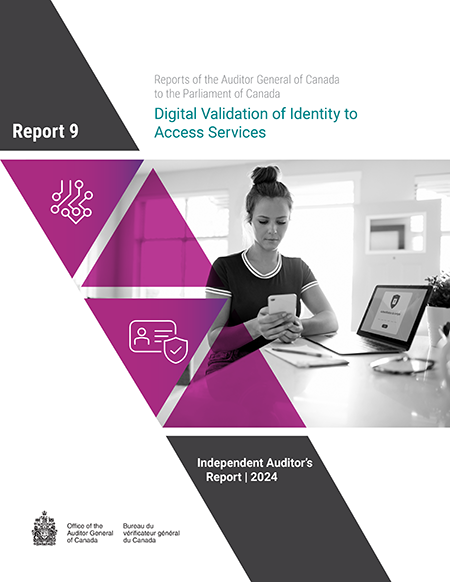2024 Reports 8 to 12 of the Auditor General of Canada to the Parliament of Canada
Report 9—Digital Validation of Identity to Access Services
At a Glance
The Treasury Board of Canada Secretariat has made little progress in leading the federal government’s work towards developing a national approach for validating a person’s identity digitally to access services from all levels of government and elsewhere in the public and private sectors. The secretariat delayed this work because of a lack of funding to move it forward. However, funding was secured to procure a much-needed component of a national approach—a federal sign-in system that would provide 1 entry point for validating a person’s identity no matter what federal government service they are accessing. The secretariat prioritized working with Employment and Social Development Canada and Shared Services Canada to procure a new system that would replace almost 90 separate sign‑in portals managed by individual federal departments.
A national approach must, however, go beyond a new federal sign-in system and requires several other important components such as collaboration between all levels of government and key partners supported by legislation, regulations, standards, and technology. Some provinces have already begun implementing their own approaches to validating a person’s identity digitally for accessing online services. This means that digital access to services across the country is evolving without a national approach to ensure the security, reliability, and interoperability of systems involved in validating digital identity. A national approach is important to ensure seamless and secure access to online services in the public and private sectors for Canadians across the country.
As we concluded our audit, it was unclear whether the development of a national approach for validating a person’s identity digitally would proceed and whether the transition to a new federal sign-in system would be funded without presenting an unmanageable financial burden on departments. Our 2023 audit report on modernizing information technology systems found that most departments and agencies do not have sufficient funding to meet their modernization needs. Funding has been secured for procuring a new federal single sign-in system, but the Treasury Board of Canada Secretariat, Employment and Social Development Canada, and Shared Services Canada do not yet know what it will cost for departments to make that transition or how those costs will be funded.
Key facts and findings
- The Treasury Board of Canada Secretariat did not receive funding to develop a national approach. However, Budget 2024 provided $25.1 million over 5 years to Employment and Social Development Canada to establish a modern, single sign‑in portal for federal government services.
- Between 2010 and 2022, Canada’s global ranking in the United Nations E‑Government Development Index fell from 3rd to 32nd. Among the Group of Seven (G7) countries, Canada’s ranking fell from 2nd to 6th, which indicates that Canada is not progressing as rapidly in e-government development as other G7 countries.
Why we did this audit
- Canadians increasingly rely on digital technology to connect with each other, to work, and to access services.
- Canadians expect to be able to digitally validate their identity to access government services and other services across the economy, trusting that their privacy is safe and that their personal information is handled responsibly.
Highlights of our recommendations
- Employment and Social Development Canada should lead the work of the federal government to plan and develop a national approach to digitally validating identity to support seamless and secure access to online services for Canadians across jurisdictions. In doing so, the department should
- consult with relevant parties to determine the resources it needs, including appropriate funding
- determine how to secure the funding and then proceed to do so
- ensure that the federal government single sign‑in system will interoperate with other systems across jurisdictions
Please see the Link opens a PDF file in a new browser windowfull report to read our complete findings, analysis, recommendations and the audited organizations’ responses.
Exhibit highlights
Comparison of Group of Seven (G7) countries in establishing digital identity legislation and a single sign‑in system
| G7 country | Legislation related to digital identity | Single sign-in system |
|---|---|---|
| Canada | No | No |
| France | Yes | Yes |
| Germany | Yes | Yes |
| Italy | Yes | Yes |
| Japan | Yes | Yes |
| United Kingdom | In progress | Yes |
| United States | No | Yes |
Source: Based on information from the UN E‑Government Survey © 2022 by United Nations, and information from government websites available at the time of the audit
Related information
Entities
Tabling date
- 2 December 2024
Related audits
- 2023 Reports 5 to 9 of the Auditor General of Canada to the Parliament of Canada
Report 7—Modernizing Information Technology Systems

